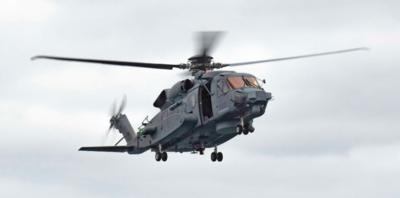Thu, Jun 18, 2020
The Return To Flying Operations Follows A Thorough Risk Assessment
The Commander of 1 Canadian Air Division, Lieutenant-General Alain Pelletier, has lifted the operational pause on the CH-148 Cyclone maritime helicopter fleet, following a 29 April 2020 accident that took the lives of six persons.

The return to flying operations follows a thorough risk assessment that outlined mitigation measures to ensure aircrews understand the conditions that led to the crash and how to avoid or resolve them.
The accident took place during a return for shipboard recovery, as the aircraft made a pass on the port side of the ship, from stern to bow. The aircraft then executed a left hand turn to establish a downwind leg in preparation for approach to the ship. Astern and inside the control zone of the ship, the aircraft commenced a final left turn to set-up for the approach. During this final complex manoeuvring turn to close with the ship, the aircraft did not respond as the crew would have anticipated. This event occurred at a low altitude, was unrecoverable and the aircraft entered a high energy descent and impacted the water astern the ship. The aircraft was destroyed and all six occupants were fatally injured.
While the Directorate of Flight Safety investigation continues, information that the investigation uncovered to date —primarily from the Cyclone’s flight data recorder — allowed the investigative team to replicate the conditions in the CH-148 Cyclone flight simulator and rule out any mechanical failure. This revealed that the aircraft’s flight director was set to hold a specific altitude and airspeed. Thus, during the complex manoeuvering turn to align with the ship, the pilot’s inputs were significantly different from the autopilot settings and the aircraft did not respond in a way that the crew was expecting. The investigative team has confirmed that this rare anomaly only occurred under a very specific and narrow set of circumstances. The crew would have had no previous exposure or experience on how to handle this situation.
With these circumstances now clearly understood, the RCAF has completed a detailed risk assessment and is implementing mitigation measures to allow for the safe resumption of flying operations.
More News
Its Offerings Are Lighter, Cleaner, and Now Pushing Past 1,000nm on SAF Jet Fuel DeltaHawk’s diesel-powered aircraft lineup has seen incredible upgrades over the last few yea>[...]
The Airplane Experienced A Total Loss Of Engine Power On December 3, 2025, about 1600 central standard time, a Mooney Aircraft Corp. M20K, N57229, was substantially damaged when it>[...]
Make Sure You NEVER Miss A New Story From Aero-News Network Do you ever feel like you never see posts from a certain person or page on Facebook or Instagram? Here’s how you c>[...]
Aero Linx: European Society of Aerospace Medicine (ESAM) As a pan-European, independent forum, it works to promote the safety and health of all persons involved in aviation and spa>[...]
“We are excited to see Wisk achieve this milestone, and I’m so proud of the team that made it possible. The team at Wisk has built advanced technologies across flight c>[...]
 Aero-TV: DeltaHawks Diesel Power Steps Into the Spotlight
Aero-TV: DeltaHawks Diesel Power Steps Into the Spotlight NTSB Prelim: Mooney Aircraft Corp. M20K
NTSB Prelim: Mooney Aircraft Corp. M20K ANN FAQ: Turn On Post Notifications
ANN FAQ: Turn On Post Notifications ANN's Daily Aero-Linx (12.20.25)
ANN's Daily Aero-Linx (12.20.25) Aero-News: Quote of the Day (12.20.25)
Aero-News: Quote of the Day (12.20.25)



